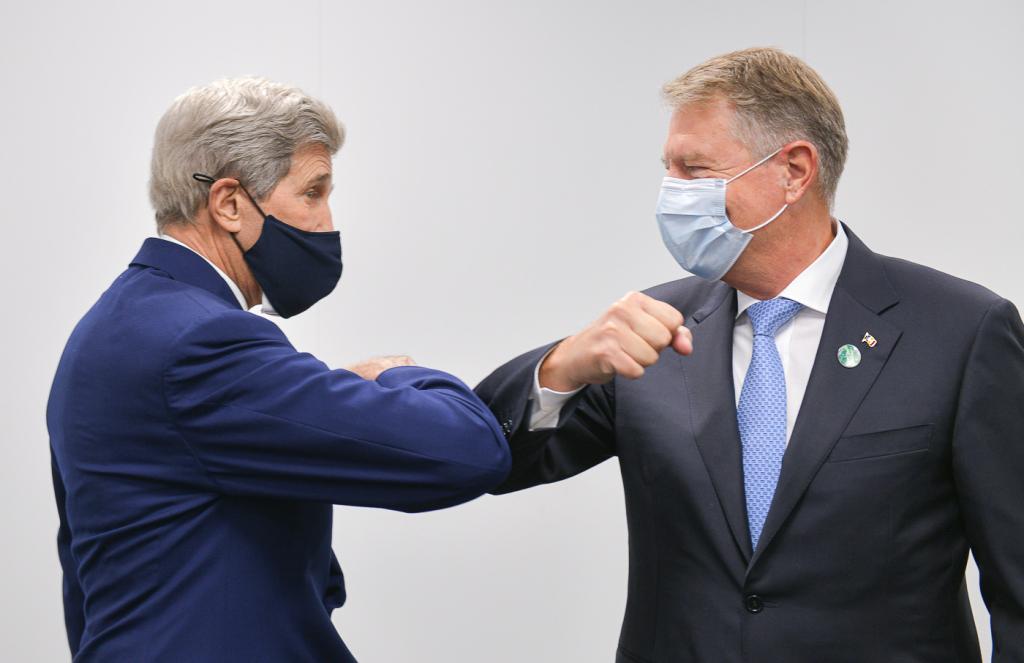Thessaloniki gets ready for its metro launch in November
The underground rapid transit lines have been under construction for almost two decades due to various project delays
 TheMayor.EU logo
TheMayor.EU logo 
L-R: John Kerry, US President's Representative for Climate Change, Klaus Iohannis, President of Romania, Source: Romanian Presidency
The joint agreement is for a small modular nuclear reactor, which will create the same type of jobs as those in the coal-power sector
Yesterday, Romanian president Klaus Iohannis and the US President’s Special Representative on Climate Affairs John Kerry announced their joint effort to build the country’s first nuclear small modular reactor (SMR). The new agreement was announced during the COP26 Conference in Glasgow.
According to a press release, it has the potential to create thousands of jobs, while pushing Romania’s energy sector towards rapid decarbonisation, as the announcement stated that the facility will be operational by 2028.
One of the major criticisms against nuclear reactors is how inflexible they are, considering the uneven energy output of renewable sources. In essence, it takes a lot of effort to start the reaction in a nuclear reactor and it is very hard to modulate the output.
Renewables, however, are an energy source that constantly fluctuates, depending on the weather. This means that the supporting infrastructure in the energy mix also needs a certain degree of flexibility.
Enter SMRs, a relatively recent iteration on nuclear reactors. They offer low costs, scalability and flexibility. This helps them work better with renewable sources. They are cheaper to build and can be located in various places, as opposed to traditional nuclear reactors, and their capacity can be increased to match consumption.
SMRs can also be used to produce hydrogen, industrial-grade thermal energy and desalinated water. Another important fact is that they can be crucial in decarbonising difficult coal power-dependent regions since they offer jobs for the same employees.
According to a statement by the United States Government, the new development will initially create around 3,700 US and Romanian jobs, however, that can scale up to 30,000 as the project grows. The investment will also strengthen the US-Romania partnership in the civil nuclear sector and position USA as a leader in the development of SMRs.
The modular reactor will consist of 6 units, each capable of supporting 270 jobs, directly transferable from the coal power sector with minimal interdisciplinary training. At the same time, the US government will provide about 1.7 million euros in the form of technical assistance to Romania to help the country become a regional centre in SMR technology.

The underground rapid transit lines have been under construction for almost two decades due to various project delays

Now you can get your wine in Talence by paying directly in Bitcoin

That’s because the state has to spend money on updating the railway infrastructure rather than subsidizing the cost of the popular pass

Rethinking renewable energy sources for the urban landscape

The examples, compiled by Beyond Fossil Fuels, can inform and inspire communities and entrepreneurs that still feel trepidation at the prospect of energy transition

Now you can get your wine in Talence by paying directly in Bitcoin

The 10th European Conference on Sustainable Cities and Towns (ESCT) sets the stage for stronger cooperation between the EU, national and local level to fast track Europe's transition to climate neutrality.

At least, that’s the promise made by the mayor of Paris, Anne Hidalgo

The underground rapid transit lines have been under construction for almost two decades due to various project delays

At least, that’s the promise made by the mayor of Paris, Anne Hidalgo

Hostal de Pinós is located in the geographical centre of the autonomous region

Despite its church-y name, the district has long been known as the hangout spot for the artsy crowds

Urban dwellers across the EU are having a say in making their surroundings friendlier to people and the environment.

Forests in the EU can help green the European construction industry and bolster a continent-wide push for architectural improvements.

Apply by 10 November and do your part for the transformation of European public spaces

An interview with the Mayor of a Polish city that seeks to reinvent itself

An interview with the newly elected ICLEI President and Mayor of Malmö

A conversation with the Mayor of Lisbon about the spirit and dimensions of innovation present in the Portuguese capital














